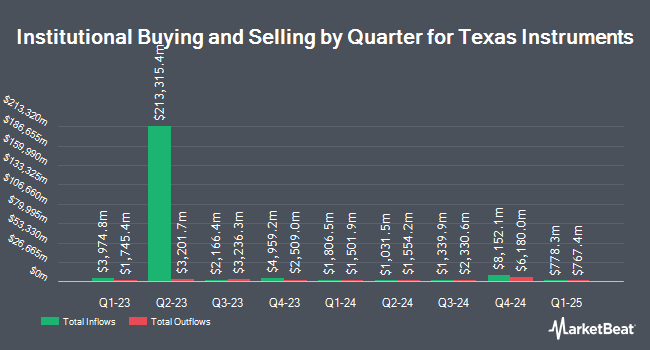Argus Investors Counsel Inc. lessened its position in shares of Texas Instruments Incorporated (NASDAQ:TXN - Free Report) by 32.0% during the 1st quarter, according to its most recent Form 13F filing with the Securities & Exchange Commission. The firm owned 3,184 shares of the semiconductor company's stock after selling 1,500 shares during the quarter. Argus Investors Counsel Inc.'s holdings in Texas Instruments were worth $572,000 at the end of the most recent quarter.
Other hedge funds have also added to or reduced their stakes in the company. Vanguard Group Inc. boosted its stake in shares of Texas Instruments by 0.7% in the 4th quarter. Vanguard Group Inc. now owns 93,567,277 shares of the semiconductor company's stock valued at $17,544,800,000 after purchasing an additional 649,620 shares during the last quarter. Geode Capital Management LLC lifted its holdings in Texas Instruments by 1.3% in the fourth quarter. Geode Capital Management LLC now owns 21,554,142 shares of the semiconductor company's stock valued at $4,032,599,000 after buying an additional 267,352 shares during the period. Charles Schwab Investment Management Inc. lifted its holdings in Texas Instruments by 11.6% in the fourth quarter. Charles Schwab Investment Management Inc. now owns 21,487,468 shares of the semiconductor company's stock valued at $4,029,115,000 after buying an additional 2,237,035 shares during the period. Norges Bank bought a new position in Texas Instruments in the fourth quarter valued at approximately $2,584,490,000. Finally, Alliancebernstein L.P. grew its holdings in Texas Instruments by 6.9% during the 4th quarter. Alliancebernstein L.P. now owns 12,706,971 shares of the semiconductor company's stock worth $2,382,684,000 after acquiring an additional 822,797 shares during the period. Institutional investors own 84.99% of the company's stock.
Analysts Set New Price Targets
A number of research analysts have recently weighed in on the company. TD Securities reissued a "hold" rating and issued a $160.00 price target on shares of Texas Instruments in a research note on Thursday, April 24th. Morgan Stanley reiterated an "underweight" rating and issued a $148.00 price objective (up previously from $146.00) on shares of Texas Instruments in a report on Thursday, April 24th. Stifel Nicolaus reduced their target price on Texas Instruments from $200.00 to $160.00 and set a "hold" rating on the stock in a report on Thursday, April 17th. Citigroup boosted their target price on Texas Instruments from $210.00 to $220.00 and gave the stock a "buy" rating in a research report on Monday, June 9th. Finally, Summit Insights downgraded shares of Texas Instruments from a "buy" rating to a "hold" rating in a research report on Thursday, April 24th. Four analysts have rated the stock with a sell rating, twelve have assigned a hold rating, nine have given a buy rating and two have issued a strong buy rating to the company. Based on data from MarketBeat, the stock currently has an average rating of "Hold" and a consensus price target of $189.86.
Check Out Our Latest Analysis on Texas Instruments
Texas Instruments Stock Down 2.3%
TXN stock traded down $4.66 during trading hours on Friday, reaching $195.00. 5,138,164 shares of the stock were exchanged, compared to its average volume of 6,378,731. The firm's 50-day moving average is $172.92 and its 200-day moving average is $182.03. Texas Instruments Incorporated has a 12 month low of $139.95 and a 12 month high of $220.39. The company has a market cap of $177.15 billion, a price-to-earnings ratio of 37.57, a PEG ratio of 3.30 and a beta of 1.00. The company has a debt-to-equity ratio of 0.76, a current ratio of 4.12 and a quick ratio of 2.88.
Texas Instruments (NASDAQ:TXN - Get Free Report) last posted its quarterly earnings data on Wednesday, April 23rd. The semiconductor company reported $1.28 earnings per share (EPS) for the quarter, topping analysts' consensus estimates of $1.06 by $0.22. Texas Instruments had a return on equity of 28.08% and a net margin of 30.68%. The business had revenue of $4.07 billion during the quarter, compared to the consensus estimate of $3.91 billion. During the same period last year, the company earned $1.10 earnings per share. Texas Instruments's quarterly revenue was up 11.1% on a year-over-year basis. On average, equities research analysts expect that Texas Instruments Incorporated will post 5.35 earnings per share for the current year.
Texas Instruments Dividend Announcement
The firm also recently disclosed a quarterly dividend, which was paid on Tuesday, May 13th. Stockholders of record on Wednesday, April 30th were given a $1.36 dividend. This represents a $5.44 dividend on an annualized basis and a dividend yield of 2.79%. The ex-dividend date was Wednesday, April 30th. Texas Instruments's dividend payout ratio is presently 103.23%.
Texas Instruments Profile
(
Free Report)
Texas Instruments Incorporated designs, manufactures, and sells semiconductors to electronics designers and manufacturers in the United States and internationally. The company operates through Analog and Embedded Processing segments. The Analog segment offers power products to manage power requirements across various voltage levels, including battery-management solutions, DC/DC switching regulators, AC/DC and isolated controllers and converters, power switches, linear regulators, voltage references, and lighting products.
Further Reading

Before you consider Texas Instruments, you'll want to hear this.
MarketBeat keeps track of Wall Street's top-rated and best performing research analysts and the stocks they recommend to their clients on a daily basis. MarketBeat has identified the five stocks that top analysts are quietly whispering to their clients to buy now before the broader market catches on... and Texas Instruments wasn't on the list.
While Texas Instruments currently has a Hold rating among analysts, top-rated analysts believe these five stocks are better buys.
View The Five Stocks Here
Almost everyone loves strong dividend-paying stocks, but high yields can signal danger. Discover 20 high-yield dividend stocks paying an unsustainably large percentage of their earnings. Enter your email to get this report and avoid a high-yield dividend trap.
Get This Free Report
Like this article? Share it with a colleague.
Link copied to clipboard.